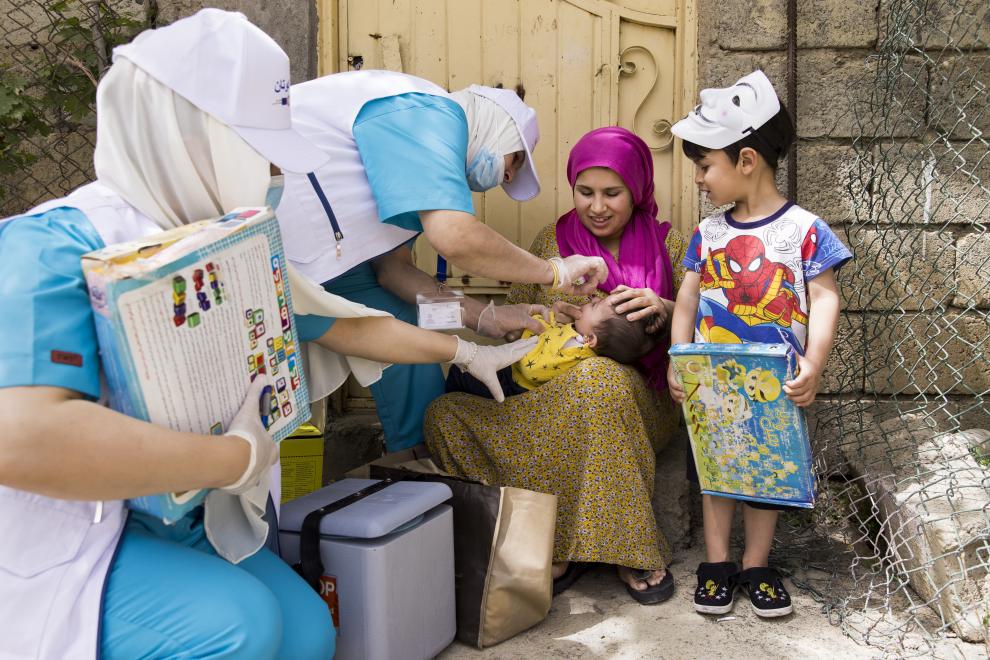Ahmedabad
(Head Office)Address : 506, 3rd EYE THREE (III), Opp. Induben Khakhrawala, Girish Cold Drink Cross Road, CG Road, Navrangpura, Ahmedabad, 380009.
Mobile : 8469231587 / 9586028957
Telephone : 079-40098991
E-mail: dics.upsc@gmail.com

News: The UNICEF released its global flagship report ‘The State of the World’s Children 2023: For Every Child, Vaccination,’ highlighting the importance of immunization in children.
The WHO defines immunization as “the process whereby a person is made immune or resistant to an infectious disease, typically by the administration of a vaccine.”
o There is a decline in vaccine confidence globally.
o It was observed that around 67 million children missed out on vaccinations between 2019 and 2021. In 2022, the number of measles cases was more than double the total in the previous year.
o Inequity observed in access to vaccination. It was found that unvaccinated children often live in rural areas/urban slums.
o There is a growing threat of vaccine hesitancy due to factors such as access to misleading information and declining trust in vaccine efficacy.
o Between 2020 and 2021, the number of zero-dose children in India decreased from 3 million to 2.7 million. However, India was among the top 20 countries with the largest numbers of zero-dose children.
o “Zero dose children” refers to children who have not received any vaccines at all or have not received any vaccines according to the recommended schedule for their age.
o 98% of the population in India currently perceive vaccines as important for children
o India was able to bring down the number of zero-dose children due to sustained evidence-based catch-up campaigns (Intensified Mission Indradhanush (IMI), watchful work done ASHA workers and increased follow-up in routine immunization). Thus, evidence based catchup campaigns have helped.
o Increase the implementation of Immunization Agenda 2030 and Gavi Strategy 5.0 to promote equity and sustainably scale up immunization coverage.
o Rise in spending on immunization and health by investing in primary health care at the national level can help promote sustainable and equitable vaccine coverage.
o Demand for vaccination can be strengthened by talking to communities, tackling gender barriers, and rethinking accountability in health systems.
o Building of resilient and robust digital health infrastructure can help in the long run as observed in the case of India’s digital health platform Technology Enabled Community Health Operations (TeCHO+) and electronic vaccine intelligence network (eVIN) which has helped increase vaccination coverage.

Address : 506, 3rd EYE THREE (III), Opp. Induben Khakhrawala, Girish Cold Drink Cross Road, CG Road, Navrangpura, Ahmedabad, 380009.
Mobile : 8469231587 / 9586028957
Telephone : 079-40098991
E-mail: dics.upsc@gmail.com
Address: A-306, The Landmark, Urjanagar-1, Opp. Spicy Street, Kudasan – Por Road, Kudasan, Gandhinagar – 382421
Mobile : 9723832444 / 9723932444
E-mail: dics.gnagar@gmail.com
Address: 2nd Floor, 9 Shivali Society, L&T Circle, opp. Ratri Bazar, Karelibaugh, Vadodara, 390018
Mobile : 9725692037 / 9725692054
E-mail: dics.vadodara@gmail.com
Address: 403, Raj Victoria, Opp. Pal Walkway, Near Galaxy Circle, Pal, Surat-394510
Mobile : 8401031583 / 8401031587
E-mail: dics.surat@gmail.com
Address: 303,305 K 158 Complex Above Magson, Sindhubhavan Road Ahmedabad-380059
Mobile : 9974751177 / 8469231587
E-mail: dicssbr@gmail.com
Address: 57/17, 2nd Floor, Old Rajinder Nagar Market, Bada Bazaar Marg, Delhi-60
Mobile : 9104830862 / 9104830865
E-mail: dics.newdelhi@gmail.com